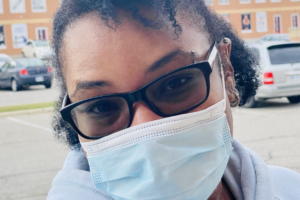Earlier today, I received a beautiful surprise that brought tears to my eyes – a stunning bouquet of flowers from someone very special in my support system. The thoughtful card attached contained a profound Jamaican proverb: “Ebry day bukit go a well, one day de buckit battam mus drap out.” This means that no bad or unsustainable situation lasts forever—sooner or later, consequences will come [1]. I realize now that my friend was reminding me to focus on my own healing and growth rather than dwelling on the past or the actions of my ex. The way he chooses to live his life is his own responsibility, and I trust that the universe will hold him accountable in due time. This is why my favourite AA slogan, “Trust The Process,” resonates so deeply with me. It’s a reminder that healing is a journey, and by staying committed to my own well-being and personal growth, I will continue to bloom and thrive, no matter what challenges I’ve faced.
The Journey Through Darkness
When you’re deep in the trenches of narcissistic abuse, it’s easy to feel utterly alone, worthless, and hopeless. Narcissists have a way of slowly chipping away at your self-esteem, gaslighting you into questioning your own reality and isolating you from your support system [2][3]. It’s an insidious form of emotional manipulation that can leave deep scars.
For a long time, I struggled to even recognize that what I was experiencing was abuse. I made endless excuses for my partner’s hurtful behaviour, convinced that if I just loved them enough, they would change. I poured all my energy into the relationship, only to be met with coldness, criticism, and a constant shifting of goalposts. No matter what I did, it was never enough.
The Hardest Goodbye
Perhaps the most heart-wrenching aspect of my journey was having to walk away from my ex-partner’s child, whom I had been raising as my own. Deciding to leave meant cutting out a piece of my heart to save the rest. I knew that staying in that toxic environment wasn’t healthy for either of us, but the pain of that separation still echoes through my healing journey.
Breaking Patterns: A History of Growth
This wasn’t my first encounter with narcissistic abuse. In previous relationships, I didn’t even know what the term “narcissist” meant. I internalized so much of the abuse, believing that I was the broken one and that I somehow deserved to be treated poorly [6]. It’s taken years of work to unlearn those destructive narratives and recognize that my trauma did not diminish my inherent worthiness. I’ve always deserved respect, love, and so much more than the bare minimum.
The Power of Sobriety and Self-Love
My journey of healing is deeply intertwined with my sobriety – 2,479 days and counting. Each day of sobriety has been a step toward stronger self-love and clearer boundaries. The tools I’ve developed in recovery have become instrumental in recognizing and breaking free from toxic relationship patterns.
Practical Strategies for Healing
Through my journey, I’ve discovered several crucial strategies for recovery:
1. Build a Strong Support System [5][9]
– Reconnect with trusted friends and family
– Join support groups for survivors
– Work with trauma-informed therapists
2. Establish Firm Boundaries [3][10]
– Learn to say “no” without guilt
– Trust your intuition
– Limit contact with toxic individuals
3. Practice Self-Care Rituals [7]
– Maintain sobriety and healthy habits
– Engage in regular physical activity
– Use holistic healing methods (meditation, journaling)
4. Educate Yourself [4][6]
– Read books about narcissistic abuse
– Follow expert resources
– Join recovery workshops
The Research Behind Recovery
According to recent studies in psychological trauma [8][9], survivors of narcissistic abuse often experience significant improvements in well-being when they:
– Engage in regular therapy sessions
– Practice mindfulness and self-compassion
– Maintain strong social connections
– Develop clear boundaries
As Dr. Ramani Durvasula, a leading expert in narcissistic abuse recovery, emphasizes: “The best revenge on a narcissist is living well and finding your joy again.” [1][9]
Moving Forward with Hope
As I look at these flowers, I’m reminded of how far I’ve come. Each petal represents a small victory in my journey toward healing. While the path hasn’t been easy, it has led me to a deeper understanding of myself and my worth.
To anyone currently struggling in a narcissistic relationship: Your pain has a purpose. Your intuition is your guide. Your healing journey may be challenging, but you’re stronger than you know. As the Jamaican proverb suggests, better days are coming. Keep putting one foot in front of the other. You’ve got this.
Resources for Support
– National Domestic Violence Hotline: 1-800-799-SAFE (7233)
– Local support groups for narcissistic abuse survivors
– Trauma-informed therapy services
– Online recovery communities
If you’re struggling with narcissistic abuse and need support, reach out. You don’t have to walk this journey alone. There is strength in healing in numbers. Connect with me and others who understand what you’re going through. Together, we can reclaim our power and build lives of joy, peace and purpose.
About the Author: Anya Nicola is a survivor, advocate, and founder of multiple ventures dedicated to healing and empowerment. Through her work at As Told By Anya Ltd. and Inner Child Curative Inc., she helps others find their voice and reclaim their power.
#narcissisticabuse #narcissisticrelationship #emotionalabuse #gaslighting #selflove #selfcare #healing #recovery #sobriety #mentalhealth #therapy #support #boundaries #redflags #survivor #innerstrength #resilience #hope #empowerment #jamaicaproverbs #gratitude #friendship
References
[1] Stages of Healing After Narcissistic Abuse https://www.choosingtherapy.com/stages-of-healing-after-narcissistic-abuse/
[2] Narcissistic Relationships: Signs, Impact, and How to Cope https://www.simplypsychology.org/narcissistic-relationships-signs-impact-and-how-to-cope.html
[3] How to Heal from Narcissistic Abuse with 7 Key Steps – Centre of Excellence https://www.centreofexcellence.com/getting-over-a-narcissist/
[4] Narcissistic Supply: Definition, Signs, and Breaking the Cycle https://psychcentral.com/health/what-is-narcissistic-supply
[5] Signs You’re Healing From Narcissistic Abuse | Charlie Health https://www.charliehealth.com/areas-of-care/personality-disorders/signs-youre-healing-from-narcissistic-abuse
[6] 9 Signs You’re Dating a Narcissist https://www.healthline.com/health/mental-health/am-i-dating-a-narcissist
[7] 7 Tips for Healing from Narcissistic Abuse — Talkspace https://www.talkspace.com/mental-health/conditions/articles/narcissistic-abuse-recover-heal/
[8] Narcissistic Personality and Its Relationship with Post-Traumatic Symptoms and Emotional Factors: Results of a Mediational Analysis Aimed at Personalizing Mental Health Treatment https://pmc.ncbi.nlm.nih.gov/articles/PMC9031722/
[9] Narcissistic Abuse Recovery: Ways to Heal https://psychcentral.com/disorders/narcissistic-personality-disorder/narcissistic-abuse-recovery-healing-from-the-discard
[10] How to Deal with a Narcissist: 10 Tools and Strategies to Help https://www.healthline.com/health/how-to-deal-with-a-narcissist





Leave a Reply
Your email is safe with us.